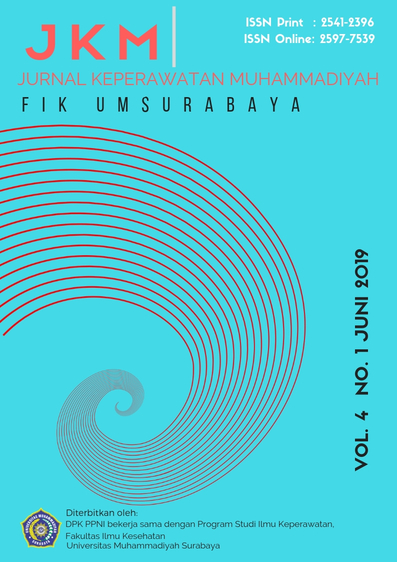Persepsi Kontrol Perilaku dalam Niat Berhenti Mengonsumsi Minuman Beralkohol pada Mahasiswa di Surabaya
DOI:
https://doi.org/10.30651/jkm.v4i1.2071Keywords:
Alcohol misuse, college students, perceived behavioral controlAbstract
Alcohol misuse problem has been a concern all around the world, especially among adolescent. Consume alcohol beverages might cause a several problem both physically and mentally, serious accident, and also an increase in criminality. This study was about to describe perceived behavioral control of individu which can effect someone’s intention to stop drinking alcohol. This study was a qualitative research using phenomenology approachment. The data was collected with in-depth interview technique. Informant in this study was about 7 people and was selected with snowball sampling. The result showed that all of the informant had a perceived behavioral control to support their intention not consumed alcohol beverages. There were 4 informants which had a positive perceived behavioral control whilst the rest of informants had a negative perceived behavioral control. In conclusion, perceived behavioral control may effect someone’s intention to stop drinking alcohol. In addition, peer education as a social support is needed to be an effort in controlling someone’s behavior to stop drinking alcohol beverages.References
Ajzen, I. (1991). Theory of Planned Behavior. Retrieved from https://pdfs.semanticscholar.org/6256/ca4853f44ab9acb98f91f0d7848c54185ca7.pdf
Ajzen, I. (2002). Perceived Behavioral Control, Self-efficacy, Locus of Control, and The Theory of Planned Behavior.
Ajzen, I. (2005). Attitudes, Personality and Behavior. England: Open University Press. Retrieved from ajzeni-2005-attitudes-personality-and-behaviour-2nd-ed-open-university-press.pdf
Ajzen, I. (2012). The Theory of Planned Behavior. Retrieved from https://www.researchgate.net/publication/263998069_The_theory_of_planned_behavior
BNN. (2016). Hasil Survey Penyalahgunaan dan Peredaran Gelap Narkoba Pada Kelompok Pelajar dan Mahasiswa Di 18 Provinsi Tahun 2016. Ringkasan Eksekutif Hasil Survei BNN Tahun 2016. Retrieved from http://www.bnn.go.id/_multimedia/document/20170227/ringkasan_eksekutif_rev_cetak_18_feb.pdf
Collins, S. E., Ph, D., Witkiewitz, K., Ph, D., Larimer, M. E., & Ph, D. (2011). The Theory of Planned Behavior as a Predictor of Growth in Risky College Drinking *, (March), 322–332. Retrieved from https://www.ncbi.nlm.nih.gov/pmc/articles/PMC3052901/
Direktorat Jenderal Pengendalian Penyakit dan Penyehatan Lingkungan. (2015). Rencana Aksi Program Pengendalian dan Penyehatan Lingkungan. Retrieved from http://www.depkes.go.id/resources/download/LAKIP ROREN/1 perencanaan kinerja/Rencana Aksi Program PPPL.pdf
Ford, J. A., & Blumenstein, L. (2014). Self-Control and Substance Use Among College Students. Journal of Drug Issues, (May). https://doi.org/10.1177/0022042612462216
Glanz, K., Rimer, Ba. K., & Visnawath, K. (2008). Health Behavior and Health Education. United States of America: Jossey-Bass.
Gunarsa, S. D. (2008). Psikologi Perkembangan Anak dan Remaja. Jakarta: Gunung Mulia.
Irmayanti, A. (2015). Penyalahgunaan Alkohol di Kalangan Mahasiswa. Universitas Muhammadiyah Surakarta.
Maythew, M. K., Caldwell, R., Hourigan, A., Bezbatchenko, A. W., & Fried, M. (2010). Intervention Deliveries : The Role of Peer Educators in Reducing High-risk Drinking Among First-year Students, 1–37. Retrieved from https://uncw.edu/crossroads/documents/ACPA2010PeerEducators.pdf
Nurulina. (2013). Kontrol Diri pada Pecandu Alkohol. Retrieved from http://eprints.ums.ac.id/25359/9/02._Naskah_Publikasi.pdf
Priangguna, C., & Muis, D. T. (2015). Perilaku Mengkonsumsi Minuman Beralkohol Pada Mahasiswa Fakultas Ilmu Pendidikan Universitas Negeri Surabaya.
Riskesdas. (2013). Laporan Hasil Riset Kesehatan Dasar (Riskesdas). Jakarta.
Treleaven, T. M. (2015). An Examination of Some Theories that Address the Heavy Alcohol Consumption of University Students. Laurentian University, Ontario. Retrieved from https://zone.biblio.laurentian.ca/bitstream/10219/2396/1/TTreleaven-MajorPaperPDF.pdf
WHO. (2014). Global status report on alcohol and health 2014. Global Status Report on Alcohol, 1–392. https://doi.org//entity/substance_abuse/publications/global_alcohol_report/en/index.html
Downloads
Published
Issue
Section
License
- Penulis tetap memegang hak atas karyanya dan memberikan hak publikasi pertama kepada jurnal ini yang secara simultan karya tersebut dilisensikan di bawah:Â Creative Commons Attribution-ShareAlike 4.0 International (CC BY-SA 4.0)













